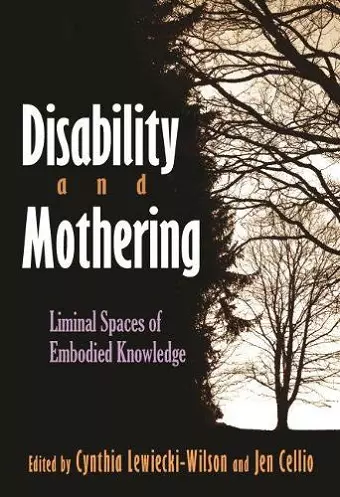Disability and Mothering
Liminal Spaces of Embodied Knowledge
Cynthia Lewiecki-Wilson editor Jen Cellio-Miller editor
Format:Hardback
Publisher:Syracuse University Press
Published:30th Sep '11
Currently unavailable, and unfortunately no date known when it will be back

Editors Lewiecki-Wilson and Cellio have put together the first book to focus on the intersecting spaces, both cultural and personal, of disability and mothering. Derived from the Latin for threshold, the word ""liminal"" calls attention to the book’s focus on the transitional moments and spaces where the personal and social, inside and outside, self and other converge. The volume features twenty-one previously unpublished essays by new as well as established scholars and community activists. Contributors, some of whom are themselves disabled or mothers of children with disabilities, present moving personal accounts and accessible scholarship grounded in historical study, experiential and retrospective analysis, interviews, social research, and feminist and disability studies theories. In their introduction, the editors survey the theoretical frameworks of feminism and disability studies, locating the points of overlap crucial to a study of disability and mothering. Organized in five sections, the book engages questions about reproductive technologies; diagnoses and cultural scripts; the ability to rewrite narratives of mothering and disability; political activism; and the tensions formed by the overlapping identities of race, class, nation, and disability. The essays speak to a broad audience—from undergraduate and graduate students in women’s studies and disability studies, to therapeutic and health care professionals, to anyone grappling with issues such as genetic testing and counseling, raising a child with a disability, or being disabled and contemplating starting a family.
As a whole, the collection is accessible and straightforward; it could easily serve as a textbook for students new to disability studies (and rhetoric), even as it encourages those of us more familiar with the field to stretch our assumptions of what disability and disability studies can mean or entail. Readers outside of the academy will also find the book useful, as it provides diverse examples of parenting with or alongside disability. The essays in Disability and Mothering reflect the lessons and insights, as well as the complications and questions that arise when disability and feminist analysis cross paths. The 21 thought-provoking essays encompass various cultural-experiential perspectives on the nexus between mothering and disability. Some of the contributors offer enlightening first-person narratives, and others write more scholarly pieces. The overarching theme is strategic resistance to perceived negative stereotypes revolving around both mothering and disability. Highly recommended.
ISBN: 9780815632849
Dimensions: 229mm x 152mm x 28mm
Weight: 680g
356 pages